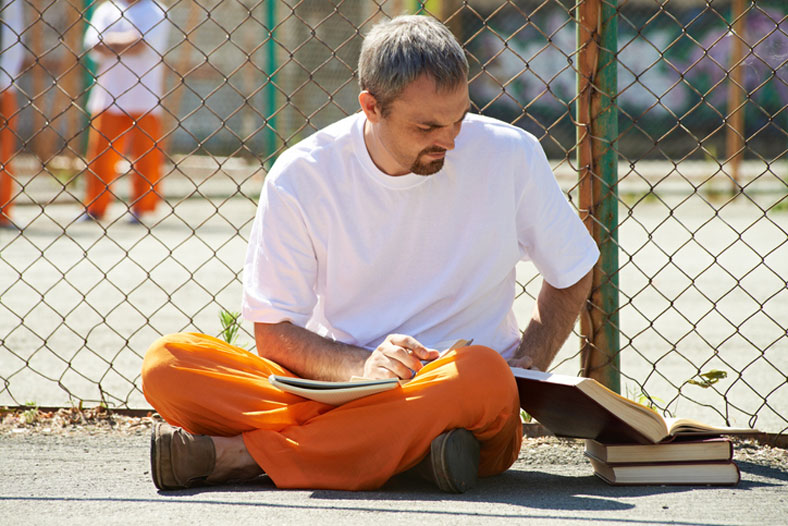Written by Jack Levinson

The social work profession is aimed at helping people of all sorts of backgrounds dealing with a wide range of problems. A central tenet of the field is to provide supportive, reparative services to any and all people who need them. This extends to those in the criminal justice system, including those who are actively incarcerated as well as people with a previous history of incarceration.
Social workers understand that those within the criminal justice system need support too, providing resources to help those with criminal pasts redeem their futures.
Those who are moved to be involved with criminal justice social work are extending a deeply meaningful gesture of forgiveness to people who have erred in the past, sometimes in ways that are extreme and upsetting. For many incarcerated individuals whose lives are oriented around punishment for their crimes, this investment of energy and support can be nothing short of life-changing.
The Link Between Social Work and Criminal Justice
During your Master of Social Work (MSW) degree program, you are likely to learn about the deep-seated causes and social histories behind some of our nation’s gravest problems. From the factors contributing to poverty to issues of racism, sexism, and homophobia to the rise of the drug epidemic, there are many different facets of American inequality that social workers must explore and understand in order to help individuals and families on the ground.
One important topic in contemporary social analysis is the criminal justice system, as well as the many factors that lead individuals to engage in criminal activity. Poverty, drug abuse, and mental health issues are all critical components of this research. So too are the criminal justice system as it operates today, the strengths and weaknesses of rehabilitative programs, and the opportunities (and lack thereof) for people who have criminal records.
Criminal justice social workers take it upon themselves to support those who many refuse to help. By understanding the social factors that lead many individuals to crime, correctional social workers help incarcerated individuals overcome the issues that turned them to criminal activity in the first place.
Social work in criminal justice can involve confronting upsetting, even painful stories. It is not necessarily an area of expertise that all social workers can take on. But those who work in the field understand the deep importance of correctional social work as an investment in individuals who have often faced serious hardship themselves as well as in the possibility of a better world. By confronting these challenging cases, many social workers see a new cause for optimism.
Criminal Justice Social Worker Job Description
Criminal justice social workers can be involved in their cause in a variety of ways, and can perform services for individuals at different stages of the criminal justice process. They can be involved in courtroom proceedings for individuals who need legal advocates, provide focused attention and care to those who are currently incarcerated, and work with ex-offenders who now face the difficulty of returning to their lives with a criminal record. Indeed, correctional social workers understand that for many who have gone through the criminal justice system, redeeming oneself can be a lifelong process.
Criminal justice social work jobs can vary greatly. The role of a social worker in correctional settings will be very different from one working in a re-entry program. Some of the top job titles for criminal justice social workers include the following:
- Transitional case managers
- Counselors and psychologists
- Conflict mediators
- Diversion program managers
- Probation officers
- Guardian Ad Litems
- Sex offender clinicians
- Mitigation or arbitration specialists
From this list alone, one might be able to see the large number of organizations that rely upon criminal justice social work. These can include correctional facilities, halfway houses, legal advocacy groups, crisis centers, and more.
If you are considering becoming a criminal justice social worker, it’s important to find the right setting for your goals and skills.
Correctional facility social workers may be moved to support people while they are still in prison, a critical moment for rehabilitative and therapeutic care. Those who work in halfway houses or other re-entry programs may be more focused on helping individuals find resources to secure housing and employment after incarceration.

How Correctional Social Workers are Transforming the Criminal Justice System
Criminal justice social workers perform a role that many people are unwilling to take on, giving them unmatched insight into the realities of the U.S. prison system, the conditions that lead many individuals to crime, and the challenges facing formerly incarcerated people. This has made them invaluable advocates for incarcerated individuals, offering informed and highly nuanced perspectives on injustices within the criminal justice system, structural causes of crime, and the needs of recently incarcerated people. This underlines the importance of correctional social work and the different scales at which it can make an impact.
Indeed, those who wish to get involved in social work at the macro level (that is, the arena of social policy and legislation) will have much to contribute if they focus their efforts in the criminal justice arena. From working to change the conditions of correctional facilities to fighting on behalf of wrongfully convicted individuals to informing the protocols and initiatives of re-entry programs, criminal justice social workers can put their on-the-ground experiences toward meaningful changes that will improve the criminal justice system overall.
Many social workers who decide to work in the correctional arena do so because they have a desire to see reform in the criminal justice system. Beyond helping individuals directly, these social workers can play a pivotal role in reform movements that will create a more equitable and humane system in years to come.
Criminal Justice Social Worker Requirements: Education and License

The requirements to become a criminal justice social worker in North Carolina are the same as for any other branch of the social work profession. One must hold a graduate degree and the appropriate social work license for your desired job.
Social Work Education Requirements
The education requirements for social workers are relatively simple.
Because social workers take on such important responsibilities, they are expected to hold a Master of Social Work (MSW) degree in order to qualify for licensing.
This is true for criminal justice social workers as well as those in any other social work field. It is not possible to become a full-fledged social worker without obtaining your MSW.
There are numerous fantastic MSW options for aspiring social workers in North Carolina. These include online and part-time options for students with outside needs, such as continuing to hold down their current job or taking responsibility for childcare. These options are a boon for prospective social workers and for the field of social work as a whole, which benefits greatly from expanding its reach to more students.
In both in-person and online formats, full-time MSW programs typically last two years. Part-time programs generally take three years. This is worth keeping in mind as you decide which educational option makes the most sense for your future goals and current needs.
In order to qualify for an MSW, one must already hold a bachelor’s degree in any subject. Those who don’t yet hold a bachelor’s degree can pursue a Bachelor of Social Work (BSW), which covers the same foundational material you’ll find in an MSW program. Because of this curricular overlap, those who hold a BSW are eligible for Advanced Standing MSW programs, which bypass the first year of course work to accelerate motivated students’ educational path. This means that those with BSWs only need to complete one year of graduate study, allowing them to hit the ground running in the social work profession.
Field Work and Practicum
An important part of the MSW experience is supervised field work, which typically takes up a significant amount of your second year of school. During their field work internships, MSW students get to see the ins and outs of their future profession, allowing them to gain experience and insight so that they are not arriving at their first social work jobs completely new to the field.
For those interested in criminal justice social work, field work is an excellent time to start building experience in your intended profession. You will find opportunities in correctional facilities, advocacy groups, re-entry programs, and more, all of which will ground your understanding of the needs of recently incarcerated individuals and the criminal justice system as a whole.
License Requirements
Upon completing your MSW, your next step will be pursing your social work license. North Carolina-based social workers must receive their licensing from the North Carolina Social Work Licensing and Certification Board (NCSWLCB).
There are two primary forms of social work license available:
Licensed Master Social Worker (LMSW): Available to students directly out of their MSW programs, this license allows you to perform all social work duties outside of clinical practice. This is a great choice for those who wish to hold roles such as case manager, care coordinator, or trial advocate. It does not allow you to perform direct counseling, though. For that, see the option below.
Licensed Clinical Social Worker (LCSW): Social workers who provide counseling or other therapeutic services to individuals, families, and groups must hold an LCSW license. If you wish to provide these services in a correctional facility, you will need to obtain this certification. Becoming an LCSW requires an additional two years of supervised field work beyond your MSW program, after which you will be eligible for your qualifying exam.
Correctional Social Worker Salary
While the Bureau of Labor Statistics does not isolate data for criminal justice social workers, one can look to their statistics for “Social Workers – all other” to gain a sense of pay levels for those in the criminal justice field.
The BLS reports that in North Carolina, these social workers earn a mean annual salary of $63,770 per year. This is quite comparable to the national average, which the BLS reports to be an average of $64,360. Nationally, the BLS reports that the top 90th percentile of this category of social worker earns $95,560 or more per year, which should be cause for optimism among social workers anxious about making enough money in this very challenging profession. Combined with North Carolina’s relatively low cost of living, this may provide a road map to a thriving career as a social worker that can support you in the long term.
FAQs
Where do criminal justice social workers work?
Criminal justice social workers are employed in a variety of settings, including correctional facilities, halfway houses and re-entry programs, legal advocacy groups, and more. They can assist individuals in all stages of the criminal justice system, from those awaiting trial to those who have been released from incarceration.
What license does one need in order to become a criminal justice social worker?
There are two license options for criminal justice social workers in North Carolina: the LCSW, which is for those who specifically intend to provide counseling and therapy to those in the criminal justice system, and the LMSW, which is a valid license for anyone who wishes to perform any type of service outside of counseling.
What is the role of a social worker in correctional settings?
Social workers who are employed at correctional facilities can perform a variety of roles. Those who are LCSWs can provide therapy and counseling to inmates, helping them address the mental health needs that may have contributed to their criminal activity and build the mental and emotional tools to reform past behaviors. Outside of clinical practice, there are numerous responsibilities social workers can take for incarcerated people, helping them take responsibility for financial concerns, navigate the impending re-entry process, communicate with family and friends outside of prison, and more.







